
The United States Chess Federation is the governing body for chess competition in the United States and represents the U.S. in FIDE, the World Chess Federation. US Chess administers the official national rating system, awards national titles, sanctions over twenty national championships annually, and publishes two magazines: Chess Life and Chess Life for Kids. The USCF was founded and incorporated in Illinois in 1939, from the merger of two older chess organizations. It is a 501(c)(3) non-profit organization headquartered in St. Louis, Missouri. Its membership as of 2020 as COVID hit was 97,000; as of 2024 the membership was 112,000.

Paul Truong is an American and Cambodian chess player, trainer, and organizer. He was born Trương Hoài Nhân in Saigon, South Vietnam. Truong holds the USCF title of National Master and the FIDE title of FIDE Master.
The NCAA Men's Tennis Championships are annual tournaments held in the spring to crown team, singles, and doubles champions in American college tennis. The first intercollegiate championship was held in 1883, 23 years before the founding of the National Collegiate Athletic Association (NCAA), with Harvard's Joseph Clark taking the singles title. The same year Clark partnered to Howard Taylor to win the doubles title.
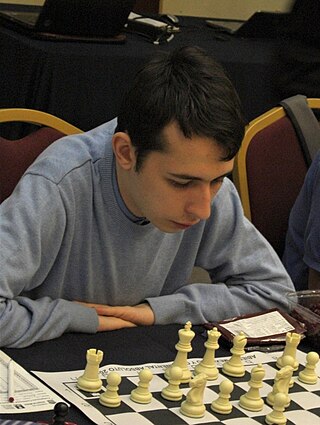
Aleksandr "Alex" Lenderman is an American chess grandmaster. He won the 2005 World Under-16 Championship in Belfort with a score of 9/10, becoming the first American to win a gold medal at the World Youth Chess Championship since Tal Shaked won the World Junior Championship in 1997.
Albert J. "Al" Lawrence is an American chess expert and author.

Alexander Vladimirovich Ivanov is a Soviet-born American chess grandmaster. Born in Omsk, present-day Russia, he moved to the United States in 1988. FIDE awarded him his Grandmaster title in 1991. He lives in Massachusetts with his wife, fellow chess player and Woman International Master Esther Epstein.
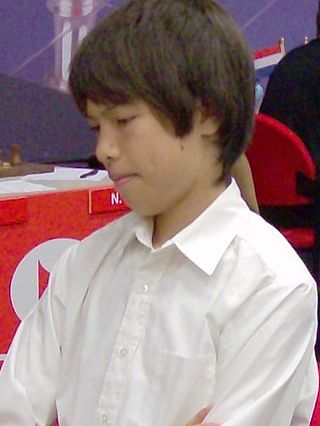
Ray Robson is an American chess player. He was awarded the title of Grandmaster by FIDE in 2010. Robson fulfilled the requirements for the title in 2009 at the age of 14 years, 11 months and 16 days, making him the youngest ever United States Grandmaster at the time.

Elshan Moradi Abadi is an Iranian-American chess grandmaster.
Tal Shaked is an American chess grandmaster who is best known for winning the World Junior Championship in 1997.
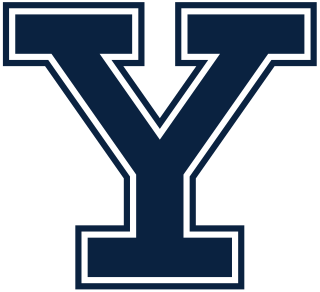
The Yale Bulldogs men's ice hockey team represents Yale University in New Haven, Connecticut and is the oldest collegiate ice hockey team in the United States. The Bulldogs compete in the Ivy League and the ECAC Hockey League (ECACHL) and play their home games at Ingalls Rink, also called the Yale Whale. The current head coach is Keith Allain, who led the Bulldogs to an Ivy League championship in his first year as head coach. Allain is assisted by former QU/UND goaltender, Josh Siembida. On April 13, 2013, the Bulldogs shut out Quinnipiac 4–0 to win their first NCAA Division I Championship.
Arthur William Feuerstein was an American chess master, and winner of the first U.S. Armed Forces Chess Championship in 1960. He represented the United States twice in FIDE Student Olympiads.
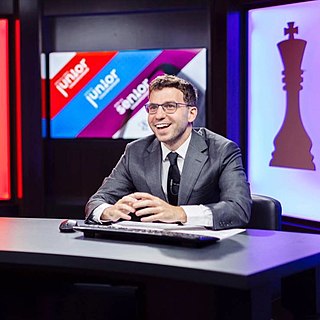
Robert Lee Hess is an American chess player who received the FIDE title of Grandmaster (GM) in 2009. In May 2012, his FIDE rating was 2635, fifth in the United States. Hess is a commentator for Chess.com, covering events such as the World Chess Championship and Candidates Tournament. He also streams chess content on his Twitch channel GMHess, which has 73,000+ followers.

Susan Polgar is a Hungarian-American chess grandmaster. Polgár was Women's World Chess Champion from 1996 to 1999. On FIDE's Elo rating system list of July 1984, at the age of 15, she became the top-ranked female chess player in the world. In 1991, she became the third woman to be awarded the title of Grandmaster by FIDE. She won eleven medals at the Women's Chess Olympiad.

Shinsaku Uesugi is a Japanese chess player who holds the title of FIDE master. He won the 40th Japanese Chess Championship in May 2007 and became the youngest ever national champion. He also played for Japan at the 38th Chess Olympiad in November 2008 and became co-champion of the U.S. National High School Championship in April 2010.

The President's Cup determines the U.S. college team chess champion. Hosted in part by the United States Chess Federation (USCF), the President's Cup is an annual invitational team championship, open to the top four U.S. schools from the most recent Pan-American Intercollegiate Team Chess Championship (Pan-Am). It is run as a fixed-roster team round-robin tournament, scored by individual points. The President's Cup usually takes place in early Spring.
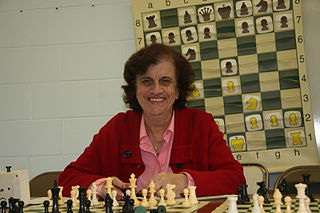
Tamara Golovey is a Chess Master, Chess International Arbiter and the Merited Coach of the Republic of Belarus. Her United States Chess Federation rating (USCF) is 2322.
Rochelle Ballantyne is an American chess player. She is best known for appearing in the 2012 documentary Brooklyn Castle. Her USCF rating is 1988, putting her in the 99th percentile of American junior players. Her FIDE rating is 1912, with her highest rating achieved being 1954 in January 2012. According to the USCF's rating system, she is currently an "Expert" or "Candidate Master."

Akshat Chandra is an American chess player. He started playing Chess during a visit to India in 2009 when he was nine years old. In 2015, he won the US National K-12 Championship and was also the US Junior Champion, the first time both titles were held by the same person in a single year. He earned the FIDE title of Grandmaster (GM) in March 2017.

Women represent a small minority of chess players at all ages and levels. Female chess players today generally compete in a mix of open tournaments and women's tournaments, the latter of which are most prominent at or near the top level of women's chess and at youth levels. Modern top-level women's tournaments help provide a means for some participants to be full-time professional chess players. The majority of these tournaments are organized by the International Chess Federation (FIDE) and revolve around the World Championship cycle, which culminates in a match to decide the Women's World Chess Champion. Beyond those events, among the most prominent women's tournaments are women's and girls' national and continental championships.

Eric Rosen is an American chess player. He was awarded the FIDE Master title in 2011 and the International Master title in 2015. Rosen began playing chess as a child with his father and brother and became the United States Chess Federation (USCF) K12 national champion in 2011. While attending the University of Illinois, Rosen was on the chess team that secured a spot at the President's Cup in 2013 and 2014.















